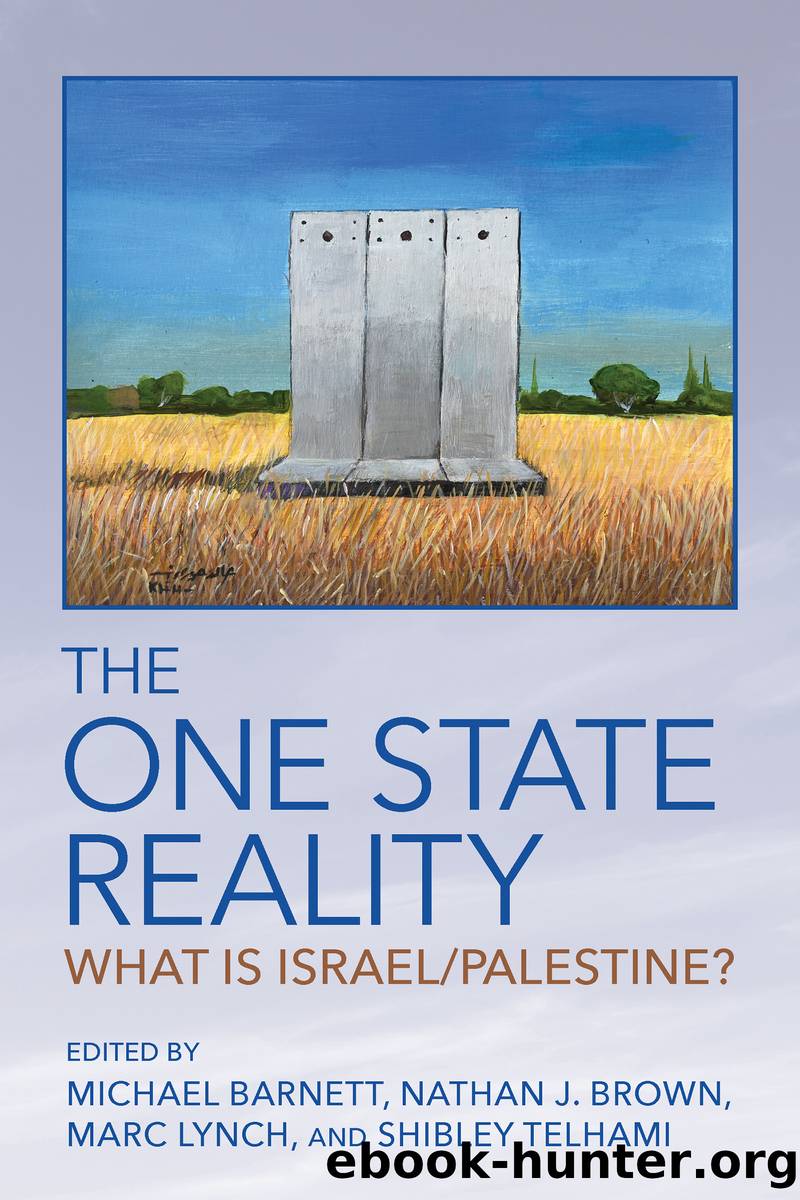The One State Reality by Michael Barnett;Nathan J. Brown;Marc Lynch;Shibley Telhami;

Author:Michael Barnett;Nathan J. Brown;Marc Lynch;Shibley Telhami;
Language: eng
Format: epub
Publisher: Lightning Source Inc. (Tier 3)
Lessons for a One State Reality
This history, and the role of short-term political success in shaping the balance between stability and change in the conceptions of national membership, carries two, somewhat contradictory lessons for the prospects of the denationalization required for a one state reality to lead to peaceful coexistence: denationalization is possible, but it will not be automatic.
The historical experience of Zionism and Palestinian nationalism shows that the kinds of denationalization required for peaceful and equitable coexistence in a one state reality are possible because similar changes have previously occurred. If Palestinian nationalism could be substituted for Arab nationalism, and a localized (though still ethnic) definition of national membership could replace a wider one for Labor Zionists, a change to a notion of the membership boundaries of the political community that includes both Jews and Palestinians is also theoretically possible. As Ian Lustick has recently argued, a one state reality has the potential to change the character of the domestic political struggle in ways that could facilitate cross-national cooperation, reinforce positive-sum framings of group relations, and potentially create positive political returns to formulations of national membership in civic terms.62
However, this same history also calls for a sober assessment of the likelihood of these transformations. Just as the role of politics in driving the evolution of nationalism makes denationalization possible, it also reinforces just how difficult its actualization is likely to be. As shown earlier, although institutional and political contexts do shape the fortunes of political movements and ideological variants, their impact is not deterministic. Even if new alliances are made and ideological modulations consistent with peaceful coexistence emerge, such changes will not spread unless they are politically successful enough to generate substantial political returns or to win the domestic political fight.
If nothing else, future projects of denationalization will be starting from a position of significant political disadvantage. Fewer than 20 percent of Israeli Jews and fewer than one-third of Palestinians in the West Bank and Gaza Strip currently support one state solutions, solutions that by definition would require some form of denationalization.63 Even this level of support may be overstated. A 2019 Palestinian Center for Policy and Survey Research (PSR) poll found, for example, that although 31 percent supported abandoning negotiations and demanding a one state solution, only 13 percent believed that a single state with equal rights for Palestinians and Jews was the best way to achieve peace (in contrast, 49% believed that a two state solution was the best way to do so).64 Omar H. Rahman and Dahlia Scheindlinâs review of public opinion on this question in chapter 12 in this volume comes to a similar conclusion. The reality that such solutions garner a relatively small following, even among the Palestinians who have comparatively more to gain from them and in a context when a two state solution is unlikely to emerge, suggests that denationalization projects have a steep hill to climb.
Although constituencies that support projects of denationalization may become large enough to reward political movements that
Download
This site does not store any files on its server. We only index and link to content provided by other sites. Please contact the content providers to delete copyright contents if any and email us, we'll remove relevant links or contents immediately.
The Pirates of Somalia by Jay Bahadur(1544)
Political Theology by Carl Schmitt(1504)
The Holocaust: A New History by Laurence Rees(1448)
The Social Animal by David Brooks(1361)
A Practical Guide to International Arbitration in London by Hilary Heilbron(1348)
Restitution by Restitution(1333)
Pirates of Somalia by Jay Bahadur(1306)
Coercing Virtue by Robert H. Bork(1267)
The Nuremberg Interviews by Leon Goldensohn(1210)
Basic International Corporate Taxation by Sebastiano Garufi(1128)
A History Of Thailand by Baker Chris(1101)
The Global Commons by Susan J. Buck(1066)
Asian Waters by Humphrey Hawksley(1061)
International Trade and Business: Law, Policy and Ethics by Gabriël Moens & Peter Gillies(1059)
Blood Profits by Vanessa Neumann(1049)
Spring Fever: The Illusion of Islamic Democracy by McCarthy Andrew C(1045)
The Sovereignty of Human Rights by Macklem Patrick(1007)
The Nuremberg Trials: The Nazis and their Crimes Against Humanity by Roland Paul(987)
Crimes Against Humanity: Historical Evolution and Contemporary Application by M. Cherif Bassiouni(967)
